Newsletter – May 2021
PRESIDENT’S COLUMN
Opening Up the Possibilities for an Accessible AAG
By Amy Lobben

Many of us “went” to the AAG annual meeting last month, scheduled to take place in Seattle. Of course, we all attended virtually from separate isolated locations. I attended from my living room, my kitchen table, and my bedroom floor… Keeping with my personal mission and my conference theme of Access, now is a good time to discuss how we all can participate in enhancing inclusion of attendees with disabilities at our meetings, whether they be national, regional, or in our departments. And wouldn’t it be nice if we all could be disciples, each carrying this message forward into our sister organizations when we attend meetings in cognate disciplines? My hope is that this column will be useful going forward, in particular for people who are as yet less familiar with disability and other accessibility issues, not just at AAG but at other conferences as well.
FROM THE MERIDIAN
A Good Day for Geography, Every Day
By Gary Langham
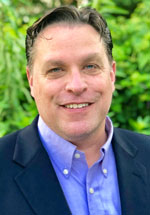 The late Will Graf would end his AAG President’s columns with this optimistic affirmation: It’s a good day for Geography. Given the last year, you might be surprised to hear that it is just as true today as it was during his tenure in 1998-99. Let me explain.
The late Will Graf would end his AAG President’s columns with this optimistic affirmation: It’s a good day for Geography. Given the last year, you might be surprised to hear that it is just as true today as it was during his tenure in 1998-99. Let me explain.
PERSPECTIVES
Working Together for Racial and Social Justice: From Anti-Asian Racism and Violence to Anti-Racist Praxis in Geography
By Guo Chen, Associate Professor of Geography and Global Urban Studies, Michigan State University
 In June 2020, the Association for Asian American Studies issued an open call for putting an immediate end to anti-Black racism and advancing efforts toward achieving global social justice. The murders of Ahmaud Arbery, Breonna Taylor, Tony McDade, and George Floyd pulled a painful trigger for many Asian Americans… Since January 2020, the lives of Asian-heritage people in the U.S. and likely the same for those in other countries have been violently shaken. Asian Americans were among the first to help local communities combat Covid-19, while racist attacks were increasing in cities like Los Angeles…
In June 2020, the Association for Asian American Studies issued an open call for putting an immediate end to anti-Black racism and advancing efforts toward achieving global social justice. The murders of Ahmaud Arbery, Breonna Taylor, Tony McDade, and George Floyd pulled a painful trigger for many Asian Americans… Since January 2020, the lives of Asian-heritage people in the U.S. and likely the same for those in other countries have been violently shaken. Asian Americans were among the first to help local communities combat Covid-19, while racist attacks were increasing in cities like Los Angeles…
ANNUAL MEETING
What was Presented at the 2021 AAG Annual Meeting?

Curious about all 2,952 papers and posters that were presented during the 2021 AAG Annual Meeting last month? Geographers Seong, JI, Stanescu, Lee, and Hwang used keyword network analysis to create a visual summary of the annual meeting. Based on presentation keywords, Urban was identified as the most frequent keyword, followed by COVID-19, GIS, and Climate Change.
Save the Date for AAG NYC!
Join us for the 2022 AAG Annual Meeting February 26 – March 1, 2022. We invite you to organize and participate in sessions, workshops, field trips, special events, and activities. Look for the call for papers in June 2021. We look forward to seeing you in New York City.
PUBLICATIONS
NEW Annals of the American Association of Geographers Issue Alert:
The 2021 Special Issue of the Annals on the Anthropocene

The Annals publishes a special issue each year to highlight research around a specific theme of global importance. The thirteenth annual special issue includes 29 articles on the Anthropocene and is guest edited by David Butler. The articles are divided into six sections: definitions and conceptual considerations; historical perspectives on the Anthropocene; physical geography and the Anthropocene; natural hazards, disasters, and the Anthropocene; the environment and environmental degradation; and the Anthropocene and geographic education. Introduced in 2000 as a concept indicating that human modification of the environment had reached such a significant level that a geological epoch distinct from the Holocene had been initiated, the Anthropocene has no universally accepted starting point. The 2021 special issue examines all geographic facets of the Anthropocene.
Read more about the Annals Special Issues.
Questions about the Annals? Contact annals [at] aag [dot] org.
NEW The Professional Geographer Issue Alert: Research featuring urban agriculture, geospatial analysis of HIV care, unemployment and more
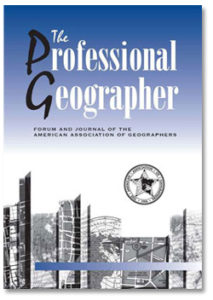 The most recent issue of The Professional Geographer has been published online (Volume 73, Issue 2, May 2021) with 14 new articles on current geographic research. Topics in this issue include direct injuries and fatalities from tornado outbreaks, shrinking cities, post-great recession geographies, electoral geography, principal component analysis, residential satisfaction in historic blocks, and structural fractality of road networks. Local areas of interest include Henan Province, Brazil, New York City, and Ethiopia. Authors are from a variety of institutions including University of Cologne, University of Connecticut, and Simon Fraser University.
The most recent issue of The Professional Geographer has been published online (Volume 73, Issue 2, May 2021) with 14 new articles on current geographic research. Topics in this issue include direct injuries and fatalities from tornado outbreaks, shrinking cities, post-great recession geographies, electoral geography, principal component analysis, residential satisfaction in historic blocks, and structural fractality of road networks. Local areas of interest include Henan Province, Brazil, New York City, and Ethiopia. Authors are from a variety of institutions including University of Cologne, University of Connecticut, and Simon Fraser University.
All AAG members have full online access to all issues of The Professional Geographer through the Members Only page. In every issue, the editors choose one article to make freely available for three months. In this issue you can read The Elasticity of Shrinking Cities: An Analysis of Indicators by Maxwell Hartt for free for the next three months.
Questions about The PG? Contact profgeog [at] aag [dot] org.
NEW Spring Issue of the AAG Review of Books Published
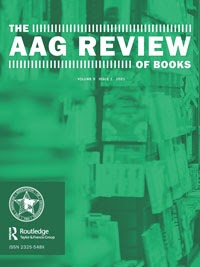
The latest issue of The AAG Review of Books is now available (Volume 9, Issue 2, Spring 2021) with 14 book reviews on recent books related to geography, public policy and international affairs. The Spring 2021 issue also includes two book review essays: Olwig’s comparison of Landscape and Power in Geographical Space as a Social-Aesthetic Construct and Landscape Theories: A Brief Introduction both by Olaf Kühne; and Kearns’ review of A Queer New York: Geographies of Lesbians, Dykes, and Queers by Jen Jack Gieseking, recipient of the 2021 Glenda Laws Award.
Questions about The AAG Review of Books? Contact aagreview [at] aag [dot] org.
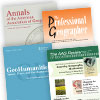 In addition to the most recently published journal, read the latest issue of the other AAG journals online:
In addition to the most recently published journal, read the latest issue of the other AAG journals online:
• Annals of the American Association of Geographers
• The Professional Geographer
• GeoHumanities
• The AAG Review of Books
ASSOCIATION NEWS
2021 AAG Nystrom Award Recipients Announced
 The J. Warren Nystrom Award, established by a former AAG President to annually recognize a paper based on a recent dissertation in geography, is awarded during a special session at the AAG Annual Meeting. Two recipients were chosen for the 2021 AAG Nystrom Award: Daniela Aiella, currently a Postdoc at Queen’s University (PhD University of Georgia), for “A colonial genealogy of eviction: racialized dispossession in Atlanta and Vancouver” and Ziqi Li, a Visiting Assistant Professor at University of Illinois Urbana-Champaign (PhD Arizona State University), for “Computational Improvements to Multiscale Geographically Weighted Regression.” The Nystrom Award session recording is available to watch in the Annual Meeting program until May 11.
The J. Warren Nystrom Award, established by a former AAG President to annually recognize a paper based on a recent dissertation in geography, is awarded during a special session at the AAG Annual Meeting. Two recipients were chosen for the 2021 AAG Nystrom Award: Daniela Aiella, currently a Postdoc at Queen’s University (PhD University of Georgia), for “A colonial genealogy of eviction: racialized dispossession in Atlanta and Vancouver” and Ziqi Li, a Visiting Assistant Professor at University of Illinois Urbana-Champaign (PhD Arizona State University), for “Computational Improvements to Multiscale Geographically Weighted Regression.” The Nystrom Award session recording is available to watch in the Annual Meeting program until May 11.
Learn more about the Nystrom Award and previous awardees.
AAG Announces Undergraduate Program Excellence Awards

Two recipients have been named for the 2021 Award for Bachelors’ Program Excellence in Geography: The Geographic Science Program at James Madison University (JMU) in Virginia, and the Department of Geography and Anthropology at Kennesaw State University in Georgia. The annual award honors Geography departments and programs that have significantly enhanced the prominence and reputation of Geography as a discipline and demonstrated the characteristics of a strong and engaged academic unit, playing an important role in educating future geographers and promoting the discipline to a wider world.
Learn more about these programs.
Get a Glimpse of AAG’s New Website
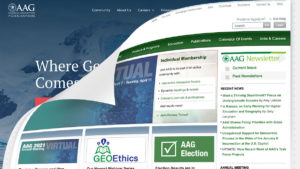 During our virtual annual meeting, we gave a sneak peek of our new website currently in the design process. If you missed the session or weren’t able to attend the conference, you still have a chance to see the recording. Our website agency, Free Range, revealed some of the exciting changes in store for this completely accessible, innovative, and mobile friendly website launching later this spring. Please send us your questions and thoughts at feedback [at] aag [dot] org. We’d love to hear from you! View the recording.
During our virtual annual meeting, we gave a sneak peek of our new website currently in the design process. If you missed the session or weren’t able to attend the conference, you still have a chance to see the recording. Our website agency, Free Range, revealed some of the exciting changes in store for this completely accessible, innovative, and mobile friendly website launching later this spring. Please send us your questions and thoughts at feedback [at] aag [dot] org. We’d love to hear from you! View the recording.
We are also looking for some fresh taglines to appear on the new AAG website when it launches this summer! What does AAG mean to you in a few words? Submit your suggestion here.
Careers in Geography: Developing Collegial Relationships in a Department
Wednesday, May 12, 2:30 – 3:45pm EST
Join AAG members in the next webinar in our Department Leadership and Early Career series. This free event brings together panelists to discuss issues of onboarding, collegiality, and how a healthy department is widely beneficial for students, staff, and faculty. REGISTER NOW!
The Department Leadership and Early Career series combines two themes in one: building and growing strong academic programs, and helping students and young geographers navigate their early careers. AAG is pleased to continue this series throughout the spring, free and open to the public. Recordings of webinars held thus far are also available to watch at any time.
See upcoming webinars and view recordings
POLICY CORNER
New Data from Census as Geographers Prepare for Redistricting
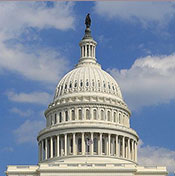
Last week the Census Bureau released its long-awaited congressional apportionment data. The 2020 population count resulted in some surprises and close-calls as states learned how many seats in the House of Representatives they will keep, gain, or lose. The release of this apportionment data was the first of two important steps in what’s next for congressional and state redistricting. States still require the Census demographic data in order to start drawing new district lines, which may not be released until late summer.
While the drawing of new maps won’t start for several months, now is the time to familiarize yourself with the process. To learn more, check out A Geographer’s Place in Redistricting published in Esri’s most recent edition of ArcNews. In this article, AAG’s Michelle Kinzer emphasizes that “when it comes to the fight for fair redistricting, there is no one better equipped than a geographer.”
In the News:
- Competing NSF bills have been introduced in the House and Senate, the NSF for the Future Act (H.R. 2225) and the Endless Frontier Act (S. 1260). While both bills propose a new NSF directorate, they are otherwise substantially different. Click here to see a side-by-side comparison prepared by COSSA.
- On March 31, the White House issued a fact sheet detailing many of the spending priorities in President Joe Biden’s proposed infrastructure initiative, the American Jobs Plan. The proposal includes $250 billion in research funding.
- Nominations are being sought for to fill eight upcoming vacancies on the National Science Board (NSB), the policy-making body of the National Science Foundation (NSF) that also serves as an independent advisor to the President and Congress on federal science policy. More information on the nomination process is available on the NSB website. Nominations are due by May 31, 2021.
MEMBER NEWS
Profiles of Professional Geographers

Growing up in the Bay Area inspired a career in hazards for Johanna Ostling, a Forestry Technician (Fire Lookout) for the U.S. Forest Service. Fire Lookouts play a vital role in identifying locations of wildfires during fire season and directing responders to the location on the ground. Ostling uses her knowledge of weather conditions to record variables like wind speed, cloud types and cloud cover, and precipitation as well as her abilities to identify physical landscape features and map coordinates to determine wildfire locations and response.
Learn more about Geography Careers on the recently updated AAG Jobs & Careers website.
May Member Updates
The latest news about AAG Members.
Four geographers are newly elected to the Academy of Arts and Sciences: incoming AAG Vice President Marilyn Raphael, 2020 AAG Lifetime Achievement recipient Ruth Wilson Gilmore, Marshall Shepherd, and 2021 Stan Brunn Award for Creativity recipient Dawn Wright. Founded in 1780, the American Academy of Arts and Sciences honors excellence and convenes leaders from every field of human endeavor to examine new ideas, address issues of importance to the nation and the world, and work together “to cultivate every art and science which may tend to advance the interest, honor, dignity, and happiness of a free, independent, and virtuous people.” Read more.
Two geographers have been elected to the National Academy of Sciences: Marshall Shepherd and 2021 Stan Brunn Award for Creativity recipient Dawn Wright. Established in 1863, the National Academy of Sciences is committed to furthering science in America, and its members are active contributors to the international scientific community. Read more.
Dr. Reece Jones of the Department of Geography and Environment at the University of Hawai‘i at Mānoa has been named a 2021 Guggenheim Fellow. Read more.
AAG Member Caroline Tracey is among eight selected to be a WW Dissertation Fellow in Women’s Studies for 2021. Tracey, a PhD candidate at the University of California, Berkeley, is working on an ethnography of the activism of women and trans deportees and return migrants in Mexico City for her dissertation. Read more.
Dr. Matt Cook of the Department of Geography and Geology at Eastern Michigan University (EMU) has been awarded the Ron Collins Distinguished Teaching Award, the highest teaching award EMU presents. He received this award in the same year as being granted tenure and serving as a co-PI on a major grant project. Read more.
RESOURCES AND OPPORTUNITIES
A Few Spaces Remaining: AAG Leadership and Early Career Workshops, 1-5 June
Two summer professional development workshops from the AAG’s Graduate Faculty Development Alliance have moved online. Registration is free and currently open, though only a few open slots are available – reserve your spot by May 15. Department Chairs, Heads, new Deans, and other emerging leaders – develop the tools you need to do your job, network with peers, and learn from top leadership professionals in an inclusive, innovative, and interactive series. The AAG Geography Faculty Development Alliance for early career geographers, as well as non-AAG members who are graduate students or teaching geography in higher education, offers an innovative, new online approach to the highly successful early career workshops that have been offered since 2002.
For more information about both workshops see http://www.aag.org/gfda or contact Dr. Patricia Price (patricia [dot] price [at] baruch [dot] cuny [dot] edu) with questions about the leadership workshop or Dr. Michael Solem (msolem [at] txstate [dot] edu) about the early career workshop.
Call for Abstracts: 2021 Climate Adaptation Research Symposium
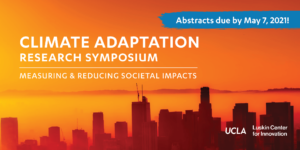 The UCLA Luskin Center for Innovation is delighted to invite abstracts for our 2021 Climate Adaptation Research Symposium. This virtual event will feature recent social science research on the impacts of climate change, particularly on vulnerable populations and communities. We’re building off the success of last year’s event, which brought together 70 presenters and more than 2,000 attendees from across the nation and world. Abstracts are welcome from economics, geography, law, public health, sociology, urban planning, and related disciplines. Research should measure the scale of climate impacts or focus on strategies to reduce these impacts.
The UCLA Luskin Center for Innovation is delighted to invite abstracts for our 2021 Climate Adaptation Research Symposium. This virtual event will feature recent social science research on the impacts of climate change, particularly on vulnerable populations and communities. We’re building off the success of last year’s event, which brought together 70 presenters and more than 2,000 attendees from across the nation and world. Abstracts are welcome from economics, geography, law, public health, sociology, urban planning, and related disciplines. Research should measure the scale of climate impacts or focus on strategies to reduce these impacts.
Submission deadline: May 7, 2021
Symposium: September 8, 2021
Learn more and submit your abstract here: https://innovation.luskin.ucla.edu/abstracts/
Please direct any questions to lcievents [at] luskin [dot] ucla [dot] edu.
Participate in AGI’s Geoscience COVID-19 Impacts Survey
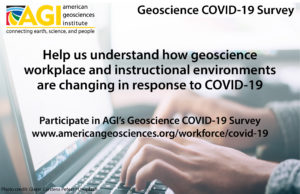 The American Geosciences Institute’s Geoscience COVID-19 Impacts study has been extended into a second phase that will continue the longitudinal study through March 2022, thanks to continued support by the National Science Foundation (Award #2029570). The second phase of this study will focus on how the COVID-19 pandemic has permanently changed the way in which geoscientists work and study and how workplace and instructional environments transition into post-pandemic configurations. The study will continue to accept new participants through January 2022 and is open to all geoscientists, including students, retirees, and those not currently employed, who reside in the United States, and are at least 18 years old.
The American Geosciences Institute’s Geoscience COVID-19 Impacts study has been extended into a second phase that will continue the longitudinal study through March 2022, thanks to continued support by the National Science Foundation (Award #2029570). The second phase of this study will focus on how the COVID-19 pandemic has permanently changed the way in which geoscientists work and study and how workplace and instructional environments transition into post-pandemic configurations. The study will continue to accept new participants through January 2022 and is open to all geoscientists, including students, retirees, and those not currently employed, who reside in the United States, and are at least 18 years old.
For more information and to participate in the study, please visit https://www.americangeosciences.org/workforce/covid19.
IN MEMORIAM
 Nancy B. Hultquist, retired Central Washington University (CWU) geography professor, died March 30th, 2021. Nancy is remembered fondly by students, friends, and colleagues. Starting out using computer punch cards, Hultquist eventually moved to using GIS, ultimately introducing countless K-12 teachers to the early iterations of making maps and GIS through NCGE workshops she participated in. She was quick to assist junior faculty and devoted countless hours to helping students find employment, including maintaining a jobs list of employment opportunities across the Pacific Northwest which currently has over 800 subscribers. Read more.
Nancy B. Hultquist, retired Central Washington University (CWU) geography professor, died March 30th, 2021. Nancy is remembered fondly by students, friends, and colleagues. Starting out using computer punch cards, Hultquist eventually moved to using GIS, ultimately introducing countless K-12 teachers to the early iterations of making maps and GIS through NCGE workshops she participated in. She was quick to assist junior faculty and devoted countless hours to helping students find employment, including maintaining a jobs list of employment opportunities across the Pacific Northwest which currently has over 800 subscribers. Read more.
The AAG is also saddened to hear of the passing of Jene McKnight and Roger Kasperson this past month with written tributes forthcoming.
FEATURED ARTICLES
Why should geographers care about data science?
By By Canserina Kurnia, Esri Senior Solution Engineer for Education, and Joseph Kerski, Ph.D., GISP, Esri Education Manager
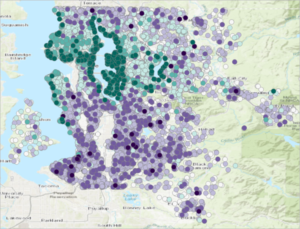 “Data science is the study of data. Data science involves developing methods of recording, storing, and analyzing data to effectively extract useful information. The discipline of geography has always been focused on data science, because geographers have always been keen to gather, analyze, and make sense of large volumes of data across a wide variety of scales and covering a wide variety of themes, from ecoregions to individual census blocks. Those using GIS are spatial data scientists: They combine their data with theoretical foundations such as Tobler’s First Law to explain and predict. As they visualize and analyze data, they detect patterns and relationships, testing real-world phenomena against hypotheses.
“Data science is the study of data. Data science involves developing methods of recording, storing, and analyzing data to effectively extract useful information. The discipline of geography has always been focused on data science, because geographers have always been keen to gather, analyze, and make sense of large volumes of data across a wide variety of scales and covering a wide variety of themes, from ecoregions to individual census blocks. Those using GIS are spatial data scientists: They combine their data with theoretical foundations such as Tobler’s First Law to explain and predict. As they visualize and analyze data, they detect patterns and relationships, testing real-world phenomena against hypotheses.
Why is geographic thinking and spatial analysis important to data science?” Continue reading.
GEOGRAPHERS IN THE NEWS
- Can We Stop “Deepfake Geography”?, Freethink and numerous other outlets covered the work of a team at University of Washington, led by geography professor Bo Zhao.
- Geographers draw up full inventory of barely researched icing fields, coverage of the work of a geography team from South Asia Institute of Heidelberg University, examining the role of icing (aufeis) in water supplies for the Upper Indus valley, Phys.org
- Covid: Can school geography field trips recover?, TES News
- Young adults’ relocations are reshaping political geography, an interview with geography professor Ryan Wiechelt of University of Wisconsin-Eau Claire.
EVENTS CALENDAR
- May 12, 2021, 2:30 – 3:45pm ET – Developing Collegial Relationships in a Department webinar
- May 26, 2021, 1:30 – 3:30pm PT – Responsible Use of Spatial Data GeoEthics Webinar
- June 1-5, 2021 – GFDA Workshop for Early Career Faculty & Graduate Students and Department Leadership Workshop
- June 1, 2021, 11:00 am – 1:30 pm ET – No Direction Home: Labor Rights and Geospatial Data GeoEthics Webinar


